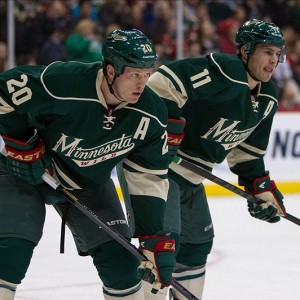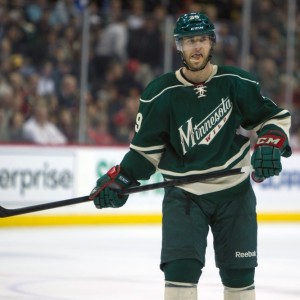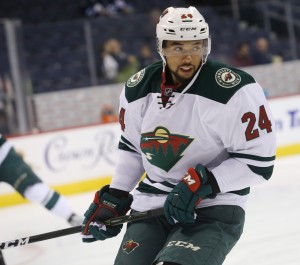Is there honestly any other team in a worse position than the Minnesota Wild entering the 2017 NHL Expansion Draft? Should they protect four defensemen to ensure the likes of Jonas Brodin and Matt Dumba remain integral parts of their blue line, or should they accept losing one of them in favor of keeping core forwards like Nino Niederreiter and Mikael Granlund away from the Vegas Golden Knights?
There are several different player protection strategies that Wild management may take but, any way you slice it, Minnesota is destined to lose a very good player to the Golden Knights come June.
Issue: No Movement Clauses
The first area of concern for Minnesota with respect to the expansion draft, is the fact that they currently have four players (Zach Parise, Mikko Koivu, Jason Pominville and Ryan Suter) signed to contracts containing no movement clauses. This means that each one of these four players must be protected from selection.

One way out of this requirement is to get any of the above mentioned players to waive their no movement clause and voluntarily become exposed for selection by Vegas as a result. Otherwise, Minnesota could convince them to accept a trade or, if push comes to shove, they could ultimately choose to buy them out of their contracts.
Realistically, there is no reason for concern regarding three quarters of the Wild players protected by such a clause. It’s safe to assume that Minnesota would protect Parise, Koivu and Suter regardless. Pominville, on the other hand, is a different story.
Once a reliable point producer, Pominville has been on a steady decline over the past few seasons. He finished the 2015-16 season with a lowly 36 points and is currently on pace for less in 2016-17. An even greater cause for alarm is the 34-year-old’s contract which carries a cap hit of $5.6 million through the 2018-19 season. All in all, Minnesota likely does not want to spend one of their valuable and limited protection slots on a struggling veteran with multiple years remaining on a pricy contract.

The former Buffalo Sabres captain does have a limited no trade clause worked into his contract which kicked in this season. This means that Minnesota could potentially deal him to another organization if they can find a match with a team who is absent from his no trade list. The problem here is that the Wild would likely have to pair Pominville with a valuable expansion-exempt asset in order to convince another general manager to trade for him. Teams would likely ask for an Alex Tuch or a Kirill Kaprizov which Minnesota undoubtedly would not be willing to do.
The Wild could go the buyout route with Pominville, which would save them a bit of cap space in the short-term, but would also stick them with a lingering cap hit for the 2019-20 and 2020-21 campaigns. As per Cap Friendly, a Pominville buyout would leave Minnesota with a cap savings of $1.25 million in 2017-18 and $3.75 million in 2018-19. It would also result in a cap hit of $1.25 million the following two seasons.
Arguably the most realistic outcome to the Pominville situation is the player agreeing to waive his no movement clause and accept exposure in the expansion draft. Pominville and his agent both know that chances are very slim that Vegas would claim the winger in the draft, considering his cap hit and the other younger players that will be available for selection from the Wild. This way, Pominville should have peace of mind that he will be returning to Minnesota for another year and it will also help the organization keep one of their valuable younger assets.
One has to wonder if the Wild might also investigate the possibility of Parise waiving his no movement clause for the expansion draft. What would be the chances the Golden Knights pluck the former New Jersey Devils captain if he was left exposed? He would have eight years left on a contract taking him past the age of 40 with an annual cap hit of $7.538 million. The big detractor for Vegas would be that they’d risk cap recapture penalties if they acquired Parise and he retired before the conclusion of his contract. In any case, leaving Pominville and Parise exposed would enable the Wild to protect four defensemen as well as key young forwards Niederreiter, Granlund and Charlie Coyle. Parise will most likely never be asked to waive his no move protection but it is food for thought when considering all of Minnesota’s options.
Strategy: 7F-3D-1G
The route that allows a team to protect the most assets could be one that Minnesota chooses to follow but it would almost assuredly result in the departure of either Brodin, Dumba, or 26-year-old Marco Scandella.

The pro of going in this direction is that Minnesota’s forward corps would stay mostly intact. They would be able to hang onto Parise, Koivu, Eric Staal, Coyle, Niederreiter, Granlund, and either Erik Haula or Jason Zucker. I would guess that Zucker would be the forward left unprotected with Minnesota hoping that George McPhee and the Golden Knights select the Las Vegas native ahead of any of the defenseman they leave unprotected. This would probably be the best case scenario for the Wild, as they would then be able to return all of their top six forwards, their third-line centre, and their full defense group for the 2017-18 season.
The odds of Vegas claiming Zucker unsolicited might not be great but they could potentially be influenced into doing so if Fletcher and McPhee can strike a deal that would be beneficial to both clubs. Such a trade would likely see the Golden Knights receiving a player like Haula, Gustav Olofsson or Christian Folin along with a draft pick in exchange for not selecting Dumba or Scandella. This way Vegas acquires three assets instead of one and Minnesota gets to keep their top five defensemen. Perhaps too good to be true but there will be a lot of moving parts and strategizing by both parties to be sure.
[irp]
Strategy: 8 Skaters-1G
Minnesota can guarantee that they keep their top four defensemen together by choosing to use the eight skater protection model. However, there are two major problems they would encounter with this approach.

Firstly, the Wild would still become susceptible to losing a solid blueliner as one of Brodin, Dumba or Scandella would remain unprotected and, secondly, they would be putting themselves at risk of losing a key forward as only four could be protected under this strategy. Assuming Parise and Koivu are locked into the protected list via their no move clauses, only two spots would remain for the likes of Staal, Coyle, Granlund, Niederreiter, and Haula. No matter which two forwards Minnesota would choose to protect, they would still be potentially losing a solid player.
The Decision?
If I’m Minnesota, I would be using the 7F-3D-1G approach. Pominville would either be asked to waive his no movement clause or be bought out. Protected from expansion would be Parise, Koivu, Staal, Coyle, Granlund, Niederreiter and Haula up front with Suter, Spurgeon and Brodin on the back end.
I would make the argument for Brodin over Dumba due to him being locked into a long-term cap friendly deal, combined with the fact that he’s having a solid bounce back year. Brodin has proven his worth in the past while Dumba is still a work in progress, albeit with a high potential ceiling. The decision to let Dumba go would be a very difficult one to make but, with the Wild’s upcoming cap crunch, he may price himself out of town once his current bridge deal expires anyway.
The ideal situation would be to secure an agreement with Vegas by offering them a combination of draft picks, roster players or prospects in exchange for passing on Dumba in the expansion draft. Failing that, there are 29 other teams around the league who might offer an expansion-exempt player to Minnesota in return for the former seventh overall pick.
Right now, the only real guarantee is that Devan Dubnyk will be the goaltender appearing at the top of Minnesota’s protected list. Anything beyond that is anyone’s guess at this point. With so many possible avenues to explore, Fletcher and the Wild will definitely be ones to watch once the Stanley Cup is handed out in June.